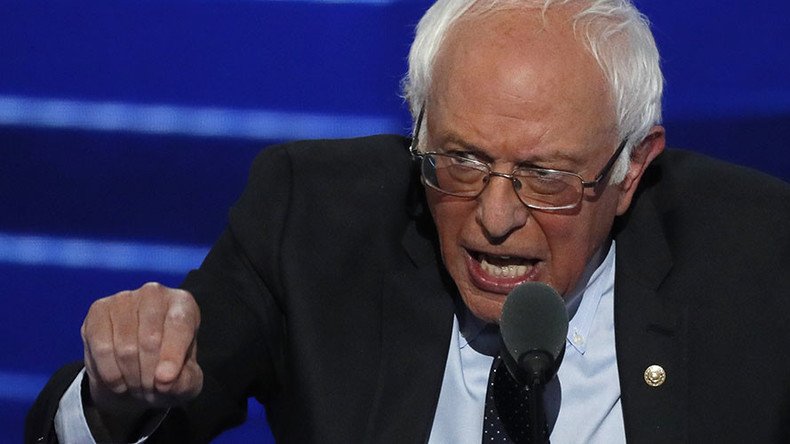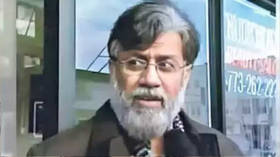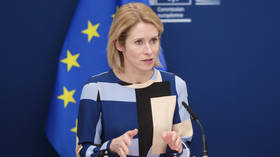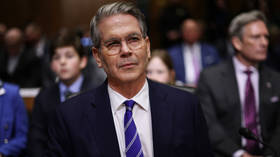Blame Bernie

The decision by Sanders to throw his support behind the Clinton campaign after he lost the nomination for the Democratic Party candidate may have deprived a third party candidate of the chance to defeat Donald Trump.
If anything, the 2016 race for the White House has only confirmed that what passes for democracy in the United States is in serious crisis, reflective of a political system that is rotten to the core.
Donald Trump, confounding all the polls and liberal media by winning the presidential election, has become in essence CEO of an empire which in the early 21st century is no longer sustainable.
The ever-deepening social and economic injustice that passes for normality in the US is the foundation upon which the American empire rests, which in concrete terms functions on the back of wars of aggression, proxy wars, and regime change. This social and economic injustice at home and projection of imperialism overseas exist in a circular relationship most simply and profoundly explained by Malcolm X in the 1960s when he remarked, “You can’t understand what’s going on in Mississippi if you don’t understand what’s going on in the Congo.”
People are dying or getting sicker because they can’t afford their insulin, just so Eli Lilly and Novo Nordisk can make outrageous profits. pic.twitter.com/5bpwnR2jJ2
— Bernie Sanders (@BernieSanders) November 1, 2016
And it is precisely here where the mass movement that Bernie Sanders inspired offered so much potential to transform the lives of the millions of ordinary Americans – of all races, ethnicity, and religion – who have been progressively crushed under the weight of the corporate juggernaut that is the real power in the country.
In this respect, the decision by Sanders to fold his tent and swing in behind the Clinton campaign after he lost the nomination for Democratic Party candidate - under decidedly dubious circumstances - was as inexplicable as it was disdainful.
Moreover, how can it be justified when he spent the primaries attacking Hillary Clinton’s integrity, record and credibility so passionately and effectively that she was left floundering to stem the rising tide of support his campaign was attracting?
The revelations contained in the classified emails brought to us courtesy of WikiLeaks merely confirm that Sanders was entirely accurate in his depiction of Hillary Clinton as a paid-up servant and champion of Wall Street and other unsavory vested interests, among them the Saudis, Qataris, and George Soros.
Mrs. Clinton didn't Just run against Donald Trump,she ran against Wiki-Leaks.She ran against Russia. She ran against Jim Comey & FBI.😭😭😭
— CASSANDRA MILLS (@CEOMills) November 9, 2016
Sanders’ support for Clinton resulted in unprecedented scenes of dissent at the Democratic National Convention in Philadelphia just after Clinton was announced the party’s candidate for president, with the claim that Clinton was selected rather than elected by the DNC resonating beyond the arena to chime with the deep and entrenched cynicism of millions when it comes to Washington.
Sanders, a man who has sat as an independent in the US Senate for over three decades, represented the hopes and determination of the disadvantaged, dispossessed, and excluded – people for whom the American dream has under the status quo manifested in their lives as a nightmare – of real and authentic change.
This is the DNC's fault. Michigan and Wisconsin are deciding the vote, states Bernie won. The DNC is at fault for rigging the primary.
— Nick Mansour (@mansour_nick) November 9, 2016
This is where the option of standing as a third party candidate was open to him. Yes, he said that if he lost the nomination to Clinton that he would not stand as an independent. But this was self-indulgence writ large given the previously mentioned mass movement that had coalesced around him in the course of the Democratic Party primaries. Jill Stein of the Green Party even extended a call for him to lead a Green Party ticket, willing to make way for Bernie as the presidential candidate while she would stand as his putative vice president.
The broader point to the lack of a viable third party in this election is that it reveals the desperate need for one in order to break the Republican and Democratic Party duopoly. Both parties are funded by and represent corporate and vested interests, regardless of the claims or rhetoric to the contrary, and neither can honestly claim to champion the needs and interests of the by now well documented 99 percent denied a place at the banquet of American democracy – or indeed plutocracy, as has increasingly been the case over the last three decades of unparalleled wealth enjoyed by the one percent on the backs of the poor.
Election Day should be a national holiday so that everyone has the time and opportunity to vote.
— Bernie Sanders (@SenSanders) November 8, 2016
There is no arguing the potential support for a third party in American politics. A recent Gallup poll revealed that 57 percent of Americans believe there is a need for a third party in the US political mainstream, which tallies with a trend going back a number of years. The question of why a third party has never successfully emerged, then, despite many attempts throughout the years to establish one, is less to do with public support for one and more to do with the lack of the subjective factor in the form of leaders such as Bernie Sanders who are serious about confronting the corporate beast that controls every facet of American life, including the political system.
As US journalist and broadcaster Chris Hedges writes, “Hope is a word that is applicable only to those who grasp reality, however bleak, and do something meaningful to fight back…Hope involves fighting against the real forces of destruction, not chanting ‘Yes We Can!’ in rallies orchestrated by marketing experts, television crews, pollsters, and propagandists, or begging Obama to be Obama. Hope, in the hands of realists, spreads fear into the black heart of the corporate elite.”
Bernie Sanders, for an all-too brief few months over the summer, was a rallying figure for precisely this kind of hope, offering the potential for a national mass movement demanding the transformational change millions of Americans have long been crying out for. Today, there is good reason to feel bitterly disappointed in his decision to give in to the Democratic Party machine so easily and abjectly.
The statements, views and opinions expressed in this column are solely those of the author and do not necessarily represent those of RT.














